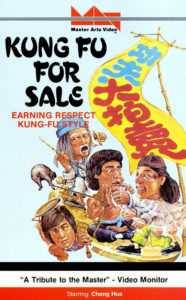AKA: Drunken Master Dollar Fist
Director: Su Chen-Ping
Cast: Sze-Ma Lung, Su Chen-Ping, Man Lee-Pang, Tseng Chao, Dean Shek Tin, Tsung Hua, Cheng Fu-Hung, Hsu Pu-Liao, Su Chen-Ping, Lee Kwan
Running time: 90 min.
By Matija Makotoichi Tomic
It’s safe to say, at least at this point, that Kung Fu on Sale is Su Chen-Ping’s best film, as it also appears to be his only one. Making a name for himself in the industry since the 60’s, Su Chen-Ping first started out as an actor, then tried his hand as an action director with a couple of solid titles to boast, before he ended up working with Pearl Cheung; well, which Taiwanese filmmaker didn’t? Kung Fu on Sale arrives at the time when comedy was all the rage in kung fu movies, and it’s clear right from the start Chen-Ping aims to ride the trend. For those of you who don’t care reading beyond this point to see if his lonely debut is worth the time, Kung Fu on Sale offers just your average fu fun, so if great is what you’re looking for you’ll have to look elsewhere.
That of course doesn’t mean there’s nothing to be enjoyed here, especially if slapstick, breaking eggs on someone’s head and kicking a midget are your thing. Be advised, Kung Fu on Sale arrives with questionable humor and those familiar tonal shifts guaranteeing drama on top of the few laughs you’ll be getting, but always keeping it light. Part of that humor relies on sketches granting the movie almost episodic quality. Starring as a down on his luck kid who just wants to learn kung fu is Sze Ma-Lung, an actor that probably wouldn’t be anybody’s first choice as a lead, let alone one that is supposed to make his audience laugh. To be able to learn kung fu his character Hsiang Wua needs money, so he roams the town in search of a job willing to carry bags with rice or work at the local egg shop. For some reason, however, he either can’t get a job or fails to keep one.
Most of the first hour is pretty much spent on Wua looking for work, or his quarrels with a kung fu instructor that comes in the form of Dean Shek. For better or for worse, Wua meets a group of beggars with whom he shares a roof with, and as part of the group’s plan to earn money agrees to be a human punching bag charging mere dollar a punch. All of that changes when he meets an old kung fu master (Su Chen-Ping). Once he’s had enough and gets tired of being humiliated, Wua turns to the old master for help, finally accepting to call him grandfather in exchange for lessons.
As evident, the plot is not a strongpoint of Chen-Ping’s movie. Making it all the more confusing is Man Lee-Pang’s character Yen Wu Pa who doesn’t seem to join the list of Wua’s many saboteurs, but instead offers a helping hand on more than one occasion. It is him who eventually turns out to be the main villain, when Su Chen-Ping realized his movie needs one in order to have any dramatic tension whatsoever. Luckily, by that time Wua is more than prepared for the fight, having undergone a heavy training that sees him wrestling a pig and carrying buckets with water so his teacher could wash his feet.
With a few laughs clearly not being enough to secure his film its audience, Su Chen-Ping had to rely on the action to do it. That action, unfortunately, is a mixed bag. As usual, the first few fights lack in skills worth admiring, as our hero is not yet a skillful kung fu fighter and is mostly getting his ass handed to him by superior opponents. Same thing can’t be said for Man Lee-Pang who proves to be a highly skilled kicker from the get-go, and also serves as one of three action directors here, other two being director Su Chen-Ping himself, and Tseng Chao, appearing in the movie as the Prince of Beggars. Armed with badass kicks and a killer moustache, Man Lee-Pang becomes this film’s most powerful weapon, while Sze Ma-Lung, despite relying on a double for his acrobatics, delivers one of his finer performances, on a couple of occasions very reminiscent of his Shaking Eagle routine from 18 Fatal Strikes.
Every fight between the two is a highlight here, first exchanging blows in the rain with Man Lee-Pang’s interesting use of an umbrella, then later on confronting each other during the film’s best final fight in which Sze Ma-Lung uses his freshly learned Sleepy Crane style. Taking place in a lovely misty forest, the final fight delivers solid shapes action which, regardless of undercranking and the use of cutting frames technique, delivers the goods. Su Chen-Ping’s movie is one of those where even Dean Shek shows he can deliver good moves when needed, instead of just serving as an annoying comic relief. Tsung Hua, however, is completely wasted.
Whether or not Kung Fu on Sale really is Su Chen-Ping’s sole directorial effort, or there are more to be discovered somewhere in the vaults, is a question to which the future holds the answer. Su Chen-Ping was certainly not alone in the one-time directors group, both Chang Peng-Han (Shaolin Devil, Shaolin Angel) and Chao Yun-Fei (Chinese Magic) seem to have stopped at one, which comes as no surprise considering there are entire companies that appear to have produced no more than one movie in their short life span. If you’re no stranger to Taiwanese indies, you’ve seen better; while Kung fu on Sale is no classic by any means, delivering a few laughs, a short training sequence and a Hawaii Five-O theme as a bonus, it is not a waste of your time either.
Matija Makotoichi Tomic’s Rating: 5/10



